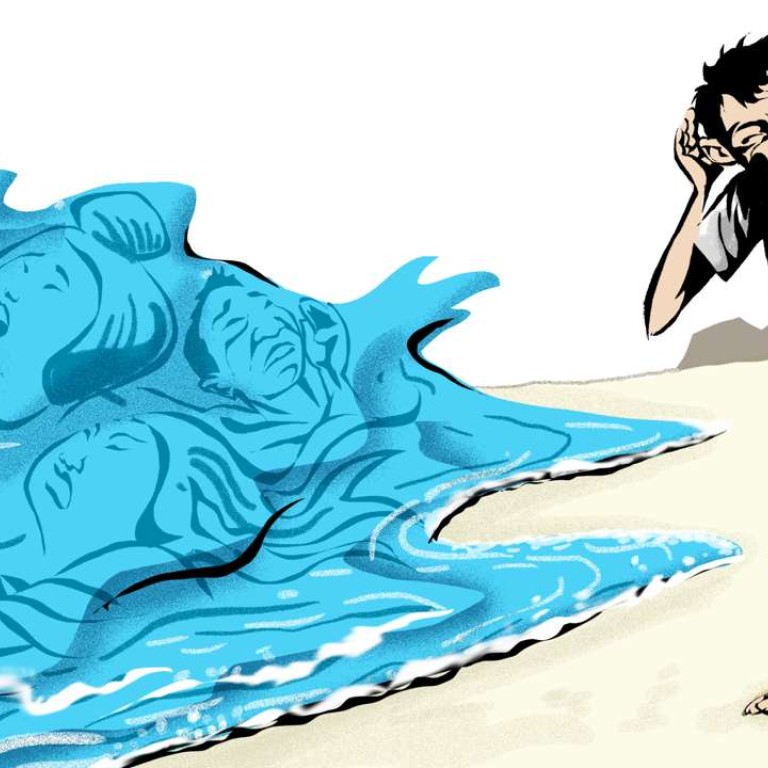
Why the Chinese are so territorial about the South China Sea
Tom Plate says the bitter disputes are not so much a cold-war-style face-off between communist China and the West, as they are a clash of perspectives between the Chinese and the rest of the world
They say some things have to be seen to be believed, which is probably why the sight of a jaunty Mark Zuckerberg jogging through Tiananmen Square was almost unbelievable – unless you were there. Am I saying that the chairman, chief executive, and co-founder of Facebook rather made a fool of himself? Well, yes, I am. But in one way or the other, at one time or another – whether peddling a bicycle or bloviating on a mainland lecture tour (me) – we all have made fools of ourselves about China. In this sense, the multi-billionaire Harvard dropout loses no more face than any of us, myself surely included.
China is hard to get right. Once the anti-social network of violence associated with Islamist extremism is contained – and it will be (in part because of the emerging dynamics of the larger peaceful Muslim world) – China will stand alone as the West’s prime number.

Now this is key: On Planet Earth, water is exactly as we earthlings know it: H2O. But on Planet Twin, while its water would look to Planet Earth-ers just like H2O, its chemistry is different – let’s dub it “Shui Too Oh”. So if a Planet Earth person were to visit Planet Twin, people on both sides might understand each other well enough indeed, until they came to the subject of water: then they would be talking about two different things.
Australia calls Beijing’s South China Sea moves ‘counterproductive
Such confusion now roils the politics of the South China Sea. This simple metaphor helps fathom the intensity of the current political storm over the slender islands, rocky islets, and semi-manufactured sand-landing strips from Planet Twin, which sees the world one way; whereas Brunei, Malaysia, the Philippines and Vietnam, on Planet Earth, see the water in another. The reality divide has become fearsome. Chinese fishing vessels swarm the waters as if they own it; smaller nations push back in anger. Boats are bumping, crew are jumping, politicians’ fists are pumping, and US warships are intruding and over-flying … so who’s losing or has lost their mind?

Troubled waters: US and China should settle row over disputed seas through diplomacy
To the West, it’s the People’s Republic of China that’s lost its bearings. It would seem that in the span of a handful of years, the China policy “brand” has gone from “peaceful rising” (acclaimed as sensible) to “in your face” (viewed as confrontational). But the Chinese view is that the waters of the South China Sea are not just H20, as the West would have it, but Shui Too Oh: “The South China Sea islands and their surrounding waters were first discovered, named, and used by the early Chinese, as well as administered by successive governments, and have been considered inherent national territory and waters since ancient times, as is attested in numerous historical records, local gazetteers, and maps.” There’s more: “The Nansha (Spratly) Islands, Shisha (Paracel) Islands, Chungsha (Macclesfield Bank) Islands, and Tungsha (Pratas) Islands (together known as the South China Sea Islands) were first discovered, named, and used by the ancient Chinese, and incorporated into national territory and administered by imperial Chinese governments…. Any claim to sovereignty over, or occupation of, these areas by other countries is illegal.”
That seems rather in-your-face coming from the communist People’s Republic of China, don’t you think?

100 Chinese boats ‘in Malaysian waters’ of disputed South China Sea: Beijing says ‘it’s fishing season’, analysts say it’s a message
But hold on a minute: This alternative definition comes not from Beijing but from Taipei. In fact, it is the official position of the government of Taiwan, known as the Republic of China; and it is virtually the same as the mainland’s. Thus the fierce South China Sea bifurcation turns out not as Communist China versus The West, but more as the Chinese Civilization versus The Rest. What we have then is not a new cold war (Beijing replacing Moscow), but a history-based resurrection of claims and counterclaims pressing onto the present.
The gap won’t be smoothed over by billionaire jog sessions or by legalistic decisions of a UN court
Planet Shui Too Oh views its chemistry as critically different from that of the West because it bubbles up from a different place. For the hundred years prior to the ending of the war against Japan, the Chinese felt oppressed, their huge wartime contribution against fascism under-appreciated, and their post-war status as a major country patronised. Here is the consensus Chinese view: “From 1842, when the Treaty of Nanjing was forced on China by the British imperialists, to the War of Resistance against Japanese Aggression, Western Powers imposed upon China up to 1,000 unequal treaties by means of force and fraud ... China had become a semi-colonial country.” This comes from a volume – China in the World Anti-Fascist War – that is little known in the West, but skillfully put together by Peng Xunhou, a professor at the Academy of Military Science of the People’s Liberation Army.
The gap won’t be smoothed over by billionaire jog sessions or by legalistic decisions of a UN court. Again (to lean on our metaphor), where the West sees seawater, the Chinese see ever-present currents of their tortured past. This is the lesson of the Twin Earth metaphor: However you look at it, the South China Sea ain’t just bubbling up H2O.
Professor Tom Plate is the Distinguished Scholar of Asian and Pacific Studies at Loyola Marymount University in Los Angeles and the author of In the Middle of China’s Future, among other books on Asia

